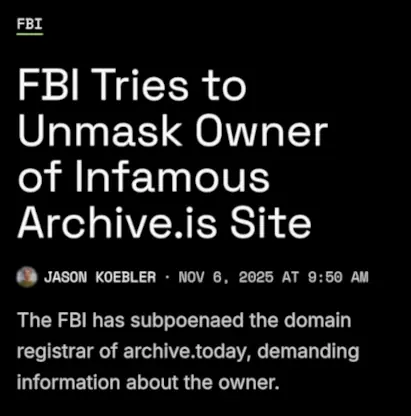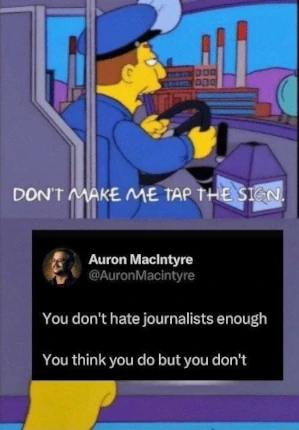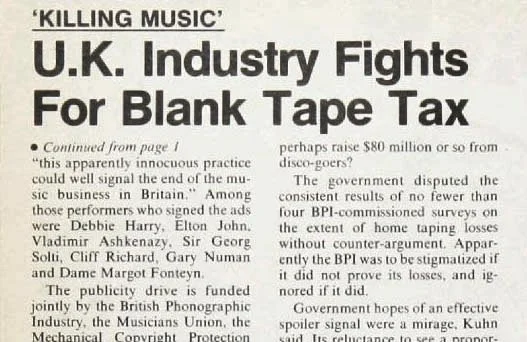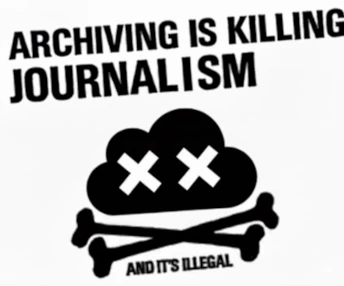Archive EVERYTHING!
We hope you onjoy the irony of us archiving the Arstechnica story on an earlier publishers attempt to muzzle Internet Archive from 2024...
Appeals court seems lost on how internet archive harms publishers
 The lickspittle FBI's attempt to unmask the owner of Archive.is (also known as Archive.today) is part of a broader investigation into the site's activities and its role in facilitating the bypassing of paywalls and copyright infringement. This move highlights the tensions between law enforcement and online anonymity, as well as the potential legal and ethical implications of web archiving services as seen in last year's Internet Archive case highlighted above.
The lickspittle FBI's attempt to unmask the owner of Archive.is (also known as Archive.today) is part of a broader investigation into the site's activities and its role in facilitating the bypassing of paywalls and copyright infringement. This move highlights the tensions between law enforcement and online anonymity, as well as the potential legal and ethical implications of web archiving services as seen in last year's Internet Archive case highlighted above.
Background on Archive.is
Ignore the desperate pearl-clutching such as this squalid 404 hitpiece by Koebler which is itself behind a paywall but which we have of course ARCHIVED for your convenience. It should carry a disclaimer since he is far from a disinterested party himself since he's been whining about this for eleven years now.Far from being 'infamous' archive.is, in fact, rightly somewhat famous as a simple web archiving service that allows users to create snapshots of web pages, which can then be accessed at a later even if the website is gone, or indeed changed. This service is popular among users who want to preserve content that might be removed or altered, such as news articles or content that is frequently updated. It is used to save snapshots of articles or government websites that are likely to change or be deleted.
 Koebler would have you believe that it fueled 'GamerGate' a controversy before my time and which I'm not interested in - since I've zero gaming interest - apart from the fact it involved sleazy journalist shenanigans. But Koebler explains 'GamerGaters would take snapshots of articles using archive.is in order to avoid sending traffic directly to the websites that published them. They also used the service to document changes to articles.' ie It helped users document and archive online discussions and content. He also bleats 'Sites like Archive.today have been used by climate change deniers 🙄 to share and criticize links to popular climate news websites, for example.' - but why, Jason? WHY? Well, the naughty little hypocrite even used archive.today himself and linked to this. If the archive-denier archives himself then what else has he been up to?
Koebler would have you believe that it fueled 'GamerGate' a controversy before my time and which I'm not interested in - since I've zero gaming interest - apart from the fact it involved sleazy journalist shenanigans. But Koebler explains 'GamerGaters would take snapshots of articles using archive.is in order to avoid sending traffic directly to the websites that published them. They also used the service to document changes to articles.' ie It helped users document and archive online discussions and content. He also bleats 'Sites like Archive.today have been used by climate change deniers 🙄 to share and criticize links to popular climate news websites, for example.' - but why, Jason? WHY? Well, the naughty little hypocrite even used archive.today himself and linked to this. If the archive-denier archives himself then what else has he been up to?
A 2013 blog post on archive.today explains that once a page has been archived, it is very difficult to delete, and that the only way to get a page deleted from the site is to email the webmaster there: “It would be ridiculous if the site which goal is to fight the dead link problem has dead links itself.”Indeed.
Déjà vu
At the time of Gamergate our narrow-shouldered hero wrote a handy guide:-
 you (can) go to Archive.today, a site that disgruntled GamerGate members are using to illegally divert traffic from websites the movement says it’s protesting.
To do that, all you’ve got to do is grab a link, go to www.Archive.today (formerly known as Archive.is) or another internet archive site, paste it in, and you’ve immediately got an ad-free and shareable copy of the copyrighted content. As far as piracy goes, it’s one of the easiest things you could possibly do, and the site’s copies are often just as readable and just as fast to load as the original.
you (can) go to Archive.today, a site that disgruntled GamerGate members are using to illegally divert traffic from websites the movement says it’s protesting.
To do that, all you’ve got to do is grab a link, go to www.Archive.today (formerly known as Archive.is) or another internet archive site, paste it in, and you’ve immediately got an ad-free and shareable copy of the copyrighted content. As far as piracy goes, it’s one of the easiest things you could possibly do, and the site’s copies are often just as readable and just as fast to load as the original.
Fantastic, thanks Jason! And just look how many times used this re Jason's former employer.
 We've seen this before in the 1980s when the abundance of relatively cheap cassette recorders and tapes meant that people (teenagers) could 'record off the radio'. DJs went through this song and dance of talking over as much of the record as they could get away with to spoil this practice. What music industry execs didn’t get was that home taping opened so many new possibilities to enjoy music – the portability, the ability to listen to a record before purchasing, the chance to get creative recording mixtapes – that “it was responsible for getting more kids into more music than ever before.” (Andrew Dickson)
Nevertheless, in 1981, the British Phonographic Industry (BPI) launched the campaign named “Home taping is killing music-and it’s illegal.” It was presented with a cool logo featuring a cassette silhouette posing like a skull with crossbones underneath.
To make a long story short, home taping did not kill music. The music industry itself almost did it.
We've seen this before in the 1980s when the abundance of relatively cheap cassette recorders and tapes meant that people (teenagers) could 'record off the radio'. DJs went through this song and dance of talking over as much of the record as they could get away with to spoil this practice. What music industry execs didn’t get was that home taping opened so many new possibilities to enjoy music – the portability, the ability to listen to a record before purchasing, the chance to get creative recording mixtapes – that “it was responsible for getting more kids into more music than ever before.” (Andrew Dickson)
Nevertheless, in 1981, the British Phonographic Industry (BPI) launched the campaign named “Home taping is killing music-and it’s illegal.” It was presented with a cool logo featuring a cassette silhouette posing like a skull with crossbones underneath.
To make a long story short, home taping did not kill music. The music industry itself almost did it.
FBI's Investigation - 'You Wouldn't Download A Magazine!'
 The FBI has subpoenaed the domain registrar Tucows to reveal the anonymous owner of Archive.is. This action is part of a federal criminal investigation since home archiving is killing journalism apparently, in the same way that home taping was killing music and it comes with a gag order, indicating the sensitivity of the case -ie the backlash that the Feds are going to get when at the same time they can't be bothered to investigate cartel activity controlling the street vendors in California.
The FBI has subpoenaed the domain registrar Tucows to reveal the anonymous owner of Archive.is. This action is part of a federal criminal investigation since home archiving is killing journalism apparently, in the same way that home taping was killing music and it comes with a gag order, indicating the sensitivity of the case -ie the backlash that the Feds are going to get when at the same time they can't be bothered to investigate cartel activity controlling the street vendors in California.
The investigation could be related to a range of issues, from copyright infringement to 'more serious crimes that might be facilitated by the site's archiving capabilities' - such as WHAT EXACTLY?!
The subpoena also requests:-
“Local and long distance telephone connection records (examples include: incoming and outgoing calls, push-to-talk, and SMS/MMS connection records); Means and source of payment (including any credit card or bank account number); Records of session times and duration for Internet connectivity; Telephone or Instrument number (including IMEI, IMSI, UFMI, and ESN) and/or other customer/subscriber number(s) used to identify customer/subscriber, including any temporarily assigned network address (including Internet Protocol addresses); Types of service used (e.g. push-to-talk, text, three-way calling, email services, cloud computing, gaming services, etc.)”
Does the FBI even have jurisdiction in canada? AFAIK Canada hasn't actually been annexed by the USA yet... Fed snitch and soi-disant 'journalist' Jason Koebler doesn't tell us but instead asks: Do you know anything else about Archive.is? I would love to hear from you. Using a non-work device, you can message me securely on Signal at jason.404. Otherwise, send me an email at jason@404media.co. (Or you can catch him on Grindr no doubt.)

"First, they came for the poets, And I did not speak up because I was not a poet. Then they came for the journalists, and I said, "Make sure you get every single journalist"
Implications
Digital Privacy: The FBI's subpoena raises questions about digital privacy and the right to anonymity online. Web archiving services like Archive.is provide a layer of anonymity for their users, and efforts to unmask their owners can set precedents for how law enforcement handles online privacy. Does put little fedsnitch care about that? I doubt it. Unless the FBI started investigating Grindr...Copyright and Paywall Bypassing: Archive.is is often used to bypass paywalls and access content without sending traffic to the original publishers - which is sometimes part of the fun! This practice can be seen as a form of copyright infringement, as it allows users to read content without compensating the publishers (don't give money to people who hate you). Legal Precedents: The outcome of this investigation could establish new legal precedents for how web archiving services are regulated and how law enforcement can compel them to reveal their owners. This could have broader implications for other anonymity-focused services and the balance between privacy and enforcement.